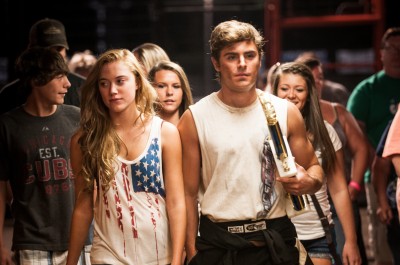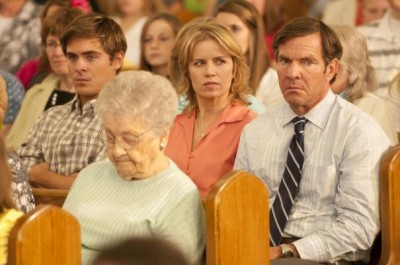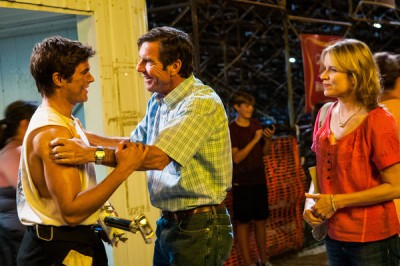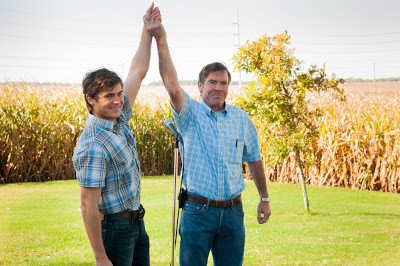| Reviews & Columns |
|
Reviews DVD TV on DVD Blu-ray 4K UHD International DVDs In Theaters Reviews by Studio Video Games Features Collector Series DVDs Easter Egg Database Interviews DVD Talk Radio Feature Articles Columns Anime Talk DVD Savant Horror DVDs The M.O.D. Squad Art House HD Talk Silent DVD
|
DVD Talk Forum |
|
|
| Resources |
|
DVD Price Search Customer Service #'s RCE Info Links |
|
Columns
|
|
|
At Any Price

Please Note: The images used here are photos provided by Sony Pictures Classics and do not directly reflect the picture quality of the Blu-ray edition under review.
Without a doubt, writer/director Ramin Bahrani (Chop Shop, Goodbye Solo) has a head on his shoulders and a thoughtful engagement with the impact of our social, political, cultural, and economic climate and its impact on individual's lives. As his latest, At Any Price, demonstrates, he's a sort of latter-day creator of old-fashioned social-problem films, redone in the post-Sundance American-independent idiom, with the intention of dramatizing What's Going On in a way that's accessible, relatable, heartfelt, and involving enough to result in any viewer's understanding that something may be out of order in the current assumptions and structures we live by. At Any Price thus locates the Janus face of contemporary, post-'08-crash America -- a mask that's a grinning, honest, hard-working simple man/good guy on one side and a vicious, aggressive, backstabbing cheat on the other -- not on Wall Street, where we're all too familiar with and removed from it, but in the "ordinary," plain-talking visage of an Iowa corn grower/seed harvester (Dennis Quaid) and his business, community, and familial concerns. It's an idea that has plenty of dramatic/cinematic potential, but Bahrani badly miscalculates when it comes to basic challenges of proportion and tone, so that what should've been affecting, even devastating in the end, winds up as something unintentionally funny -- a goofy, accidental sort-of satire (and thus at times inadvertently condescending toward the small-town/rural Midwesterners it depicts, their NASCAR races and Sunday churchgoing and picnics) when respectful but critical and incisive authenticity seems to have been the out-of-reach goal.

Quaid is Henry Whipple, an agribusiness owner playing a shady, high-stakes game by illegally reselling valuable GMO seeds while vying with his rival (Clancy Brown) for the #1 seed-provider status of all the surrounding counties in his vast, flat, corn-golden stretch of Iowa farmlands surrounding the little town of Dekalb. He's been married to his wife, Irene (Kim Dickens, Treme) for decades, has two wayward sons (one golden child who's graduated college and fled farm life, never appearing in the film except in home movies and via postcards; and the other, a hotheaded sort-of rebel played by Zac Efron, meaning to evade his default inheritance of the family farm by making it big as a NASCAR driver) and a crotchety, demanding father (Red West) breathing down his neck to keep the business viable against intimidating odds. Whipple generally presents a polite, down-home, firm-handshaking front to any and all, including his son's admiring girlfriend, Cadence (Maika Monroe, a real find of a young actress), whom he's mentoring in the ways of business in lieu of his actively disinterested son. Meanwhile, he's carrying on an affair with a pretty blonde (Heather Graham), who's also got her lusty eye set on the strapping Efron; preying on farmers weaker and poorer than himself in a vulture-like land-grab; and generally taking to heart the "expand or die" motto emblazoned upon a GMO seed company representative's PowerPoint presentation. His two faces are both equally representative of "real," heartland American values, they're utterly incompatible, and someone does, indeed, die thanks to that deep, ugly competitive streak that runs deeper than any decency.

Unfortunately, rather than digging into that rich conflict in any meaningful way that gives a sense of what's at stake, the film itself is also torn apart by oil-and-water impulses. On the one hand, there are a grown-up's soap opera and a teen drama going on that, speaking of corn, are played (one senses intentionally) with full, literal-minded, aesthetically dull and flat, crashing-cars-and-sexy-romance, thrill-of-victory/agony-of-defeat indulgence; it's frequently over-the-top, thuddingly obvious, and tiresome, and the way the actors (all skilled, even the dubious Efron, but ill-served by script and director) have been allowed/encouraged to telegraph emotions with their faces while spouting often truly dumb, expository dialogue is hilarious but deflating of the film's real purpose. In one memorably bad scene, the camera pans over toward Quaid (who's been wound up into some kind of showboating Jack Nicholson mode and then let loose) in a wide shot as Whipple "inconspicuously" gazes at a man he's wronged, his face pinpointed among a sea of churchgoers through its overdone contortion with a guilt legible from a mile away, and it's like a parody of a blunt, sappy TV movie. On the other hand, though, this is a film with much more serious concerns than providing cheap thrills and tacky Midwestern-Melrose Place melodramatics, and it expects us to be disturbed and sobered when the heart of pitch-darkness underlying the apparently asinine and harmless small-town/good-folks American dream is revealed. The destructive imperative to win "at any price," the film's happy-looking but very imaginatively subversive ending means to drive home, is hardly consigned to Wall Street and yuppies or other clear targets; the folks elsewhere who play much the same games but stil need to think of themselves (or at least present themselves) as plain, upright, and simple, are in it up to their necks, too.

But very imaginative subversion is not something you can just tack onto the last few scenes of an otherwise slavishly, mind-bogglingly conventional film and have it save the day. At Any Price has some really nice things about it, actually: An Altman-esque roving camera that moves/reframes for interesting, unpredictable compositions (as when we move slowly from Efron's appalled face in the wake of an awful, competition-driven crime he's just committed against a neighbor, to a wind turbine slowly, inexorably rotating overhead against the bright and clear Midwestern sky); little exchanges like the ones between Quaid and the very good Monroe that let the actors breathe and inhabit/develop their characters instead of clunkily pinning down situations and reminding us of plot points through stilted dialogue; and, if the story is artificial and convoluted in a way that clashes mercilessly with the film's naturalistic (and sometimes flat) look, at least Bahrani's observation of the logistics, rhythms, and day-to-day concerns and demands of contemporary agribusiness-farm life are authentic and informative by dint of his extensive research. But those nicely done touches mainly serve to make the desert of long, silly, mawkish, doggedly uninspired and haphazard stretches that much more aggravating. The level of emotional and aesthetic depth and involvement in the last 10 or 15 minutes is shockingly good, absolutely unexpected after most of what's preceded it. But it's too little, too late, and it doesn't fit, anyway; it's a transition from mindlessly "entertaining" doggerel to seriousness that's so abrupt as to be futile. That final stretch is like something out of a much better, more interesting and well-executed movie; it attests to the fact that Bahrani has good things in him. But it feels like a bit of a frustrating taunt, too, leaving us to wonder, in our bewildered disappointment: Was this sometimes interesting mishap a good-faith gesture of populism, or a cynical, bad-faith act of playing down to a presumably dumb audience? And in the end, whose intelligence has Bahrani insulted more? Ours, by assuming it's not really there, or his own, by hiding it?

Video:
The picture quality of this transfer -- presenting the film mastered in 1080/24p at its original widescreen aspect ratio of 2.40:1 -- is, as one has come to expect from Sony, very high: All the Midwest sun, blazing skies, and golden corn, all the swirling racetrack dust, all the clear moonlit nights -- the whole palette of an Iowa farm-town summer -- of Michael Simmonds's cinematography come through wonderfully well, and the dim but warm interiors keep all their nuance and character with solid darks and immaculate detail and skin tone. No artifacts of any kind are ever visible, and the film's actual texture (a hybrid of digital-intermediate and actual film) never appears compromised by overzealous digital "cleanup" done in its journey to home digital media.
Sound:The disc's DTS-HD Master Audio 5.1 surround track is excellent, too; its powers of range, clarity, and resonance are way up-front in loud racetrack or buzzing crowd scenes, but "smaller" yet equally important things like the actual aural quality of windmills slowly rotating over corn fields -- a sense of sonic space -- is well on hand, too. It all comes through impeccably, with great immediacy and solidity at every point, and never any distortion or imbalance.

--Feature commentary with writer/director Ramin Bahrani and actor Dennis Quaid, which is long on interesting logistical memories (getting five days' worth of shooting done in two and a half, for example, or which scenes were improvisatory, etc.) and even includes some intriguing clues that Bahrani is up to much more than he seems to be for the film's first three quarters. But it's short on any convincing revelations about the motivations behind many stylistic choices or the film's odd, often oil-and-water blend of naturalistic (if not flat) style, problem-film social commentary, and Lifetime Channel soap opera. Too little of that and too much mutual-admiration-society stuff from the hard-working director and actor make this commentary a bit more elusive than one might have hoped.
--Footage from the film's Toronto International Film Festival premiere (15 min.), with the four principal actors in attendance. Preceded by a glamorous red-carpet montage, the dressed-up cast and director then field post-screening questions from the audience, many of which are softball stuff. There's also a lot of mutual-admiration stuff going on here, but in response to one question, about the film's very interesting ending, Bahrani proves himself to be quite the articulate, intelligent, convincing, and rousing orator (all qualities he clearly meant for his film to have, too, but whether he was able to get those qualities onto the screen is another question, unfortunately).
--The most revealing extra is five minutes of rehearsal footage that feature digital-video "storyboards" -- scenes from the script composed, blocked, shot and edited by Bahrani in preproduction with digital video and crew members filling in for characters and holding scrip -- recognizable as scenes that we recognize (in their later, technically polished and professionally performed form) from the film. This is enlightening behind-the-scenes stuff, offering good insights into the laborious and involved preparation and honing of a film and the different ways one might go about it.
--The film's theatrical trailer, along with a clutch of previews for other Sony Pictures Classics releases.

The latest from mild-mannered American independent-cinema stalwart Ramin Bahrani (Chop Shop, Goodbye Solo) has great ambitions. Its story -- of a very contemporary Iowan farmer/agribusiness owner (Dennis Quaid), his family, and the smiley-faced but brutal and unethical competitiveness that near-invisibly permeates their aw-shucks, all-American community -- means to be a relevant, incisively macrocosmic/personal commentary on what success and community (or lack thereof) mean in still-reeling post-financial-crisis America. But Bahrani makes one fatal miscalculation after another in his storytelling. The final eighth of the film finally finds some sort of tone, and the conclusion, had it had a better buildup, would by all rights have been devastating, but Bahrain's attempted melding of the sublime and the ridiculous mostly just sits there, unmixed, so that a great deal of the film feels like a simple/literal-minded Lifetime movie about dramatically-charged bad behavior, cheating spouses, and wayward, sexy teens, with Quaid encouraged to wander through it all mugging like some scenery-chewing Godzilla. There's no hard and fast rule that a great film has to be subtle (Blow Out, for example, isn't) or all tonally smooth and integrated (Vivre sa vie isn't), but you can't, as Bahrani tries to do, play it hammy, strained, overstuffed, and on-the-nose until the very end, and then just pull a switcheroo to reveal you meant something real and important all along and expect it to resonate, or even to work. There's some real skill and thought at work in At Any Price, and it shines at odd moments, but if Bahrani's mix of ingredients is respectably adventurous, the result still leaves a bad taste. Rent It to experience the gem-like little moments that hint at what the film could have been, but there's much too little that actually pans out in Bahrani's bold but misguided experiment to make it anything like a keeper.
|
| Popular Reviews |
| Sponsored Links |
|
|
| Sponsored Links |
|
|
| Release List | Reviews | Shop | Newsletter | Forum | DVD Giveaways | Blu-Ray | Advertise |
|
Copyright 2024 DVDTalk.com All Rights Reserved. Legal Info, Privacy Policy, Terms of Use,
Manage Preferences,
Your Privacy Choices | |||||||














